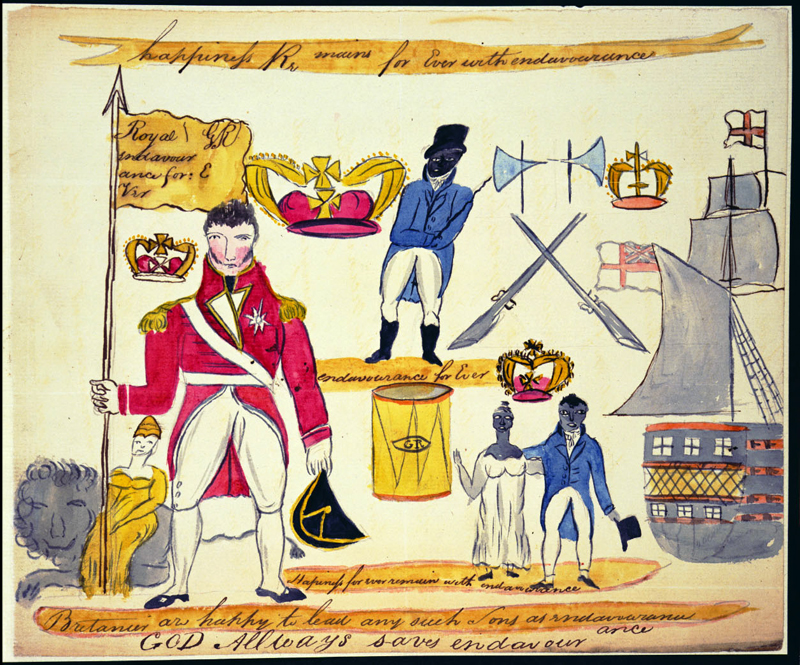This Day in Labor History: April 14, 1816

On April 14, 1816, Bussa’s Rebellion began in Barbados, when 5,000 slaves rose up against the evil system of slavery the British had placed them into, part of the broader labor system of colonization. Though the rebellion would be brutally suppressed by the British, it was a key event that laid the groundwork for the eventual emancipation of slaves in the Empire fifteen years later.
Bussa was from west Africa, probably Igbo. He was, like so many Africans, caught up in the globalized slave trade that the Europeans had started two hundred years earlier. Slavery was part of African societies, but it was far from the chattel slavery system that would be created in the Americas. It was often fluid and not generational. People could be slaves and then become members of their new societies. This got twisted very quickly when Europeans arrived in west Africa, offering guns and rum and iron pots and other goods. Add to this rapidly growing populations in west Africa due to the arrival of corn and other crops from the Americas that improved overall nutrition and you had a rising population that put more pressure on the various tribes. They all needed new land which meant bumping up against each other. Warfare increased and so did captivity. And now here came the Europeans ready to buy all the captives the tribes could find for good prices to send them to the plantations of the Americas. This seriously destabilized west African societies by the early eighteenth century. By the time Bussa was captured, perhaps around 1800, the international slave trade was coming to a closure. The Enlightenment deepened European racism and started placing a scientific patina on it, but ideas of natural rights did seep into the treatment of Africans and some began to question the entire institution of slavery.
It’s really hard to know anything about Bussa just like it is hard to know anything about almost any given slave. Other than the records about the rebellion named after him, we have nothing. Even that 1800 date for his capture is approximate and in fact 15 years of survival in these pestilent sugar plantations would place him as well above average for life span in Barbados. Probably he was some sort of overseer, or at least he had more freedom of movement than other slaves. Now, you might think that as an overseer, Bussa would be a bully. After all, this was his job. In the U.S., a slave would rarely get to this point and only if he was the most brutal person possible. But the Caribbean had far fewer whites. In any case, Bussa started talking about freedom for everyone with people he met.
In late 1815, the British Parliament was considering some of the first bills to move toward slave emancipation. But this was very early in the process. The Imperial Registry Bill would have registered slaves. This was a very minor step. But the thing is that slaves heard about it, at least in Barbados. They worried that this would make their lives even worse and they knew that there was some talk of emancipation. But it became clear in the aftermath that Bussa and his supporters were able to follow the bill and started planning an actual revolt if it failed, which it did in 1816. Bussa was able to get a cadre of relatively high-ranking slaves and free Blacks to assist his planning. This included a man named Joseph Pitt Washington Franklin, who was free and put his life up to end slavery. A woman named Nancy Grigg was a leading house slave and influenced women in the house to join. A creole slave driver named Jackey also joined.
This was a well-planned rebellion. In fact, it had its own propaganda campaign led by three free Blacks who were literate and had access to printing presses. It started on the southeast corner of Barbados and soon spread through the island. In fact, it started at the plantation where Jackey worked. They chose Easter Sunday to start the rebellion. Unlike most planned rebellions, no one in the know went and told whites. So it actually happened. The signal was setting the cane fields on fire. White plantations owners fled to the colonial capital of Bridgetown in panic.
Unfortunately, this was all a total disaster for the slaves. They next day, the island’s government declared martial law and cracked down. While they killed all of one English soldier, the cost to lives for the slaves was shocking and just horrifying. Probably about 50 were killed in the actual battle violence. That included Bussa. Then the state executed 214 additional slaves. About 170 were sold to what one must assume were even worse slave societies than Barbados. Finally, some untold number–hundreds, maybe thousands–were mutilated, either out of gratuitous punishment or to show the other slaves what happens if you take on white power. This might mean cutting off an era, branding, knife marks on the head, etc. Not good.
Bussa’s Rebellion did influence the larger debate over ending slavery in the British Empire. What the British would discover after it finally emancipated slaves in Barbados and other places in 1833, after another slave rebellion, this time in Jamaica, was that there were lots of ways to freeze labor in place and force them to work for nearly nothing without the moral opprobrium of actual slavery.
This is the 433rd post in this series. Previous posts are archived here.


